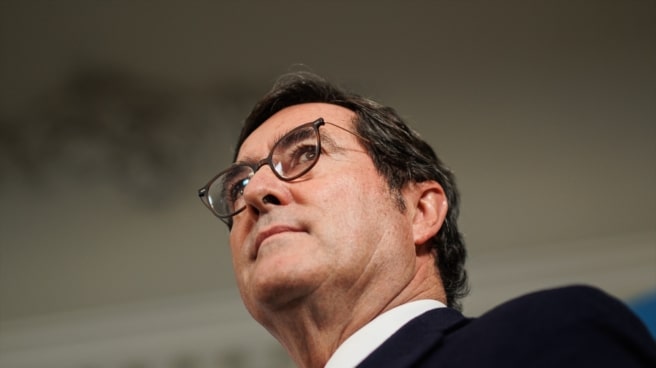

CEOE President Antonio Garamendi during the awards ceremony.
The battle to raise the interprofessional minimum wage (IMR) is not about numbers this time. On this occasion, trade unions and employers decided to announce focus on government contracts, despite the fact that Minister Maria Jesús Montero had already categorically refused to negotiate on this aspect on Tuesday. However, sources in the association of business organizations CEOE assured the newspaper that they would force the government to concede in this aspect in exchange for its agreement to a new increase in the lowest salaries.
For businessmen, it is illogical, nonsense and a problem that the executive branch is raising the minimum wage at the same time as prevents renegotiation of contracts The public has already applied. The consequence of this is that the growth of SMI stifles the subcontracting companies hired by the management and have a large number of workers receiving these salaries, and who will ultimately have to sacrifice the quality of their services.
Employers’ association president Antonio Garamendi has already said this week that the aforementioned indexation of the SMI increase is “the most reasonable”, but sources from his team are now practically setting it as a red line. They say a lot needs to change in Labour’s approach for it to agree to a non-indexed pay rise, and promises for the future are not worth it. Especially now that the trade unions UGT and CCOO are asking for the same thing. something completely unusual.
Problem, deindexation law
The conflict arises from two laws of the government of Mariano Rajoy, which are maintained by the current executive. These are the Economic De-Indexation Law and the Public Contracts Law, which prevent statutory wage increases from being carried over into public tender contracts. This is a melon that has already been tried to be opened on other occasions when Yolanda Diaz opened negotiations to increase the SMI, and in particular it was already discussed in January last year when the average inflation for 2022 remained at 8.5%, the highest since 80s.
Government refusal was constant, which contradicts her general position regarding the laws approved by the PP during the austerity policy, the same ones that led to the labor reform, now repealed by the Vice President and Minister Díaz. In fact, unions report that this situation is causing vulnerabilities among contractor and subcontractor employees, including the elimination of collective bargaining agreements, as there are companies that cannot apply wage increases if the terms in their contracts are not updated.
“We are not going to raise an issue that will cause the cost of public services to increase beyond what we currently provide. And it doesn’t seem logical that an increase in the interprofessional minimum wage would fall into the government bills that all citizens pay. “, assured the Vice President and Minister of Finance, Maria Jesus Montero. On the other hand, the Ministry of Labor has demonstrated its readiness to study the requests. But the decision is made not by this department, but by the Ministry of Economy and the Treasury, which categorically reject this idea.
SMI will grow by approximately 4%
If the CEOE does not say yes to an increase in SMI due to problems with government contracts, the unions have assured that they will be more stringent in their demands on the government. For now, UGT and CCOO asked to increase SMI by approximately 5%, under certain conditions. The Employers’ Association, for its part, proposed an increase of 3% plus an additional 1% in case of deviation from inflation, as was signed in May for all workers covered by collective agreements in the V Agreement on Labor and Collective Work. Negotiations (AENK).
If Labor accepts this latest proposal, the minimum wage will remain at €1,112 per month in 14 installments, down from the current €1,080 per month, unless inflation deviates more than expected. By his side The government proposed a 4% increase. to 1,123 euros, because he believes that it should be revalued at least as much as prices have risen – and average inflation in 2023 will be only slightly below 4%, because pensions will rise by 3.8% in January -.
On the other hand, employers demanded deduction of social contributions in the agricultural sector, that is, bonuses for agricultural workers. However, the abandonment of CCOO and UGT, as well as the Labor Party, seemed to force a retreat from CEOE, who no longer insisted that the issue be a priority. In other cases, employers have also demanded that the minimum wage be raised differently depending on the region or industry, but the government has always closed the door to these opportunities.
Source: El Independiente